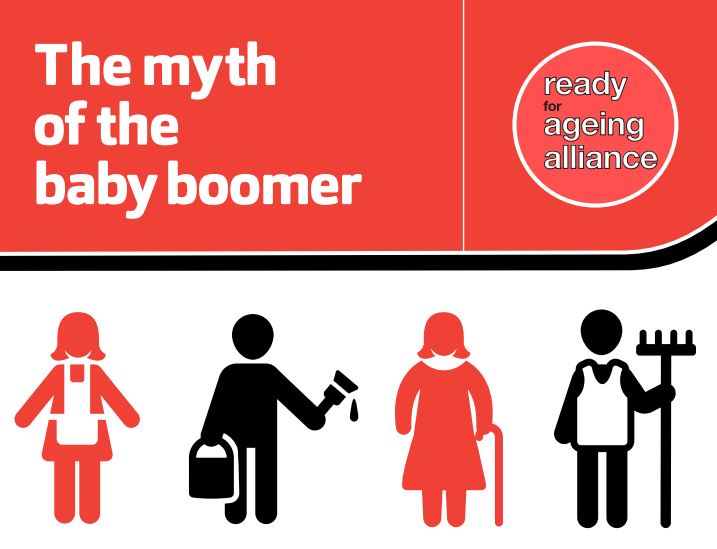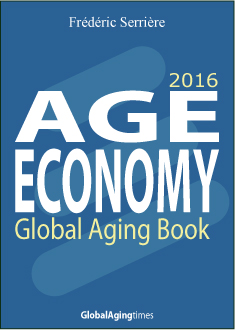A report compiled by the Ready for Ageing Alliance (RAA) seeks to dispel the widely touted myth that there is a uniform group of older people in the UK – the so-called ‘baby boomers’ who are now aged between 55 and 70 – who have benefited at the expense of younger age groups.
The claim:the Baby Boomers got a free university education
The reality: just over 13% of those aged 65-69 have a degree
While there were no fees for those who went to university in the 60s and 70s participation rates were considerably lower than today, meaning that far fewer people enjoyed this privilege than among today’s young people.
Among 55-64 year olds, just under 20 per cent have a degree as their highest level of qualification. This proportion declines still further among 65-69 year olds, among whom just over 13 per cent attained a degree.
Furthermore, older people are more likely to have either no qualifications or only those of a low level.
The claim “The Baby Boomers can look forward to security in retirement thanks to their generous pensions”
The reality: Nearly 2 million people aged 55-64 do not have any private pension savings
As would be expected, on average those in the 55-64 year age bracket have the highest wealth – they have built up assets over their working life but generally have not started to draw on these for their retirement.
28% of people in GB aged 55-64 have no private pension wealth at all (19% of men and 37% of women).
For women in this age group the median private pension wealth is £26,200. This means half of women in this group have pension savings of £26,200 or less and the other half have that amount or more. A pension fund of £26,200 would provide a lump sum of around £6,550 plus a fixed income of a little over £1,000 a year to someone approaching 65 now.
Amongst the 55-64 age cohort, total median pension wealth is £135,900 after excluding all individuals who have saved nothing. Using the L&G annuity calculator in 2014, ILC-UK projected that that could deliver an annual income of £7,638 – woefully short of what is needed to secure an adequate income in retirement.
37% of women amongst the 55-64 age group have no private pension wealth compared to 19% of men.
The housing wealth held by older people in England is £1.4tn. However, this is not evenly distributed nor easy to draw down. Looking across all older people, there are an estimated 2.6 million people with assets of greater than £100,000 but incomes of less than £15,000.
ILC-UK research on mortgage debt published in 2013 revealed that two in ten households aged 60-64 year olds had outstanding mortgage borrowing on their main residence. 60-69 year old households with mortgage debt still owed on average over £50,000.
The Claim: “Baby Boomers are so well off they can afford to retire early”
The Reality: More than seven out of ten people in their 50s and early 60s are in work
While some people in this generation are able to retire early, the vast majority (72 per cent) of people aged between 50 and State Pension age are in employment. A further per cent are either inactive because of health reasons, or because they are caring for family or looking after their home. Only 7 per cent are inactive because they have retired – and even for these people, it is far from clear that they have stopped working because they are financially comfortable.
The Pensions Policy Institute calculated that half of those aged 50-state pension age age would have to keep working for at least five years past their State Pension age in order to maintain their standard of living in retirement.
The Claim: the baby boomers bought cheap housing and are now sitting on a fortune
The reality: Not all baby boomers are homeowners and those who bought their homes had to pay high interest rates
Among households headed by someone aged 55-64:
• Just under a half (48 per cent) own their property outright.
• Nearly a quarter (24 per cent) are renting. Ten years earlier the proportion of tenants in this age group was lower at 18 per cent.
While there are people who have benefited greatly from rises in house prices the price of lending was high – often 10 per cent or more – during the 1970s and 1980s. One in ten of those aged 65+ still have outstanding mortgage borrowing. 40% of those aged 75+ who still have a mortgage, have an unlinked interest-only one.
The Claim: The boomers are spending their children’s inheritance
The reality: Some have limited wealth whilst others say they will pass wealth down to their children
Just over 50% of people aged 50 and above are relatively confident of leaving more than £50,000 in inheritance. However, this is based on individuals’ own views of their likely wealth and assets by the time they die, which is likely to be highly uncertain. For example, for some of these individuals, entering into a care home is likely to wipe out a significant proportion of their wealth.
On average, around one in three women and one in five men aged 65 will enter a care home at some point in the future and the chances of needing care increase with age. The average cost in England for a residential home is £29,016 per annum compared with £38,376 per annum for a nursing home.
One-fifth of grandparents in England aged 50+ gave money to grandchildren – totalling over £647 million in 2010
Across England, grandparents gave a cumulative total of almost £333.8 million to their grandchildren in 2010. Contributions to Child Trust Funds were of a similar amount, at £313.8 million in total.
The claim: baby boomers are all fit and healthy
The reality:About 6.7 million people aged 45-64 in GB have a long standing illness or a disability
Great Britain
• 42% or 6.67 million people aged 45-64 in GB have a long-standing illness or disability.
• This rises to 58% for 65-74 year olds (3.4 million).
• The all-age average is 32%
There are significant health inequalities across the UK. In England for example:
• Men in Richmond live on average a third longer (33.3%) or an extra 17.5 years in good health compared to Tower Hamlets.
• Women in Wokingham live an average of 15.5 years longer than women in Manchester (27.9% more)


